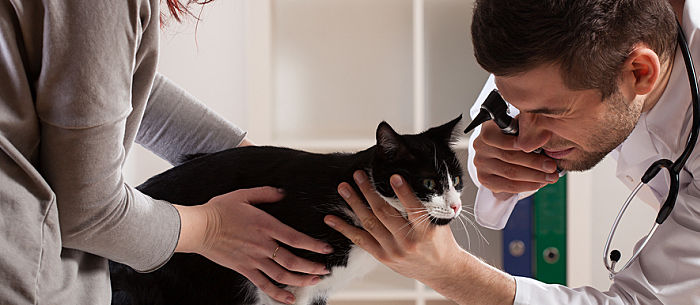Lounging around the house in pajamas seems like a good idea when you’re not feeling well. If there’s something noticeably wrong, you know when it’s time to call the doctor. Unfortunately, when you have a sick cat, your feline friend can’t vocalize his feelings to let you know where it hurts.
Many health problems can be caught at your cat’s annual exam. “There’s a reason we recommend annual exams, because we are giving these guys a thorough physical exam to pick up on things like bad teeth,” says Dr. Chris Glawe, a veterinarian at Hampden Family Pet Hospital in Englewood, Colorado. Doctors can check your cat’s teeth and coat and feel her abdomen for unusual growths, he says.
Some illnesses may appear suddenly. If you notice some of the following symptoms, you may have a sick cat on your hands:
- Digestive Problems
From diarrhea to vomiting, an uptick in digestive issues may mean you have a sick cat on your hands. Dr. Glawe says a noticeable increase in vomiting combined with a lack of appetite is reason to visit your vet. If your cat goes longer than 24 hours without eating, it’s another signal he isn’t feeling well. You may avoid food when you’re sick, but it’s unlikely you’d go 24 hours.
- Dehydration
Some pampered felines prefer moving or filtered water. “But if they stop drinking water or they show signs of white gums or pink gums that when pressed upon turn white and take longer than two seconds to return to pink, it could mean they’re dehydrated,” says Dr. Lane Smith, a veterinarian and the co-owner of Smith & Shedd Family Pet Hospital in San Antonio, Texas. Another way to check for dehydration is to gently pull the scruff of the neck. If the skin stays in that position, it may mean your cat is dehydrated and needs to see the vet. If your cat requires the freshest water before they head over to take a drink, a pet sitter can stop in the house during the day or when you go on a weekend getaway.
- Trouble Breathing
Whether your cat is breathing with his mouth open, coughing or struggling for breath, Dr. Glawe says you should bring your cat in right away.
- Lethargy
A cat may act extra sleepy if she’s dehydrated or if her food has insufficient amounts of protein. It can also be a sign of potential anorexia if your cat is a picky eater, says Dr. Smith.
- Bladder Trouble
If your cat has trouble urinating, seems constipated or you notice him going in and out of the litter box frequently, it’s time to go for a visit. Dr. Glawe says to bring your cat in immediately if he can’t urinate at all.
- Dark Urine
This can be a sign of dehydration, says Dr. Linda Shedd-Garza, also a veterinarian from Smith & Shedd Family Pet Hospital. Blood in your cat’s pee may be a sign of kidney or bladder failure.
- Seizures or a Change in Personality
Ill cats may act more reclusive, become less engaged or hang out in places they wouldn’t normally go, Dr. Glawe says. “That’s a heads up, especially when combined with not eating. It becomes a big deal,” he says. If your cat has a seizure — whether it’s full-blown convulsions or a twitch — a vet visit is necessary.
- Limping or Swelling
You may notice a limp right away after catching a glimpse of your cat’s crash landing. Limping, or any obvious swelling that you can see or feel, is cause to schedule an appointment, Dr. Glawe says. Kitty may not let you feel the area properly if it’s tender, which is another indication something is wrong.
- Urinating Outside the Litter Box
Don’t get mad at your cat just yet! Improper potty box use could be a sign of urinary tract problems, Dr. Shedd says.
- Unexplained Weight Loss or Gain
Obesity can lead to diabetes, but Dr. Glawe says sudden weight loss is equally concerning. “Cat’s don’t just automatically put themselves on diets. That would be a tip-off something is not right.”
- Skin and Hair Coat Issues
Kitties that scratch at themselves routinely can cause lesions or sores or create bald spots, Dr. Glawe says. “It could indicate fleas, parasites or allergies,” he says. Open sores that refuse to heal are also a concern. In addition to their nine lives, cats are particularly good at healing, he says. However, they often lick and fuss with wounds, causing delays in healing or leading to a secondary infection.
Remember, age can take a toll on your cat as it does in humans. “Different life stages and health conditions often require special diets,” Dr. Shedd-Garza says. “Vets can help you pick a diet that is appropriate for your cat’s needs.”
Read more about managing your cat’s health at The Cat Care You’re Not Thinking About.
Bayan Raji is a freelance writer and cat lover.
*This article is for general informational purposes only. It is not intended nor implied to be providing medical advice and is not a substitute for such advice. The reader should always consult a health care provider concerning any medical condition or treatment plan. Neither Care.com nor the author assumes any responsibility or liability with respect to use of any information contained herein.



